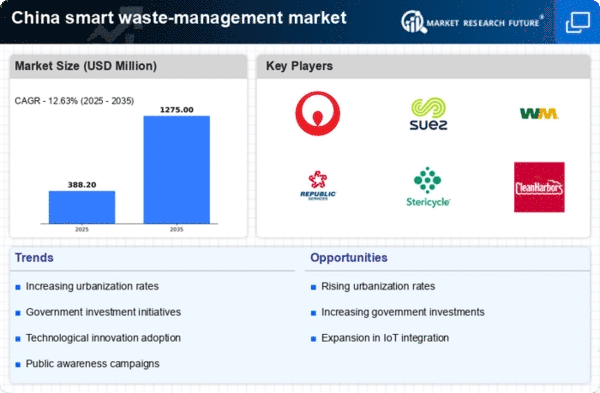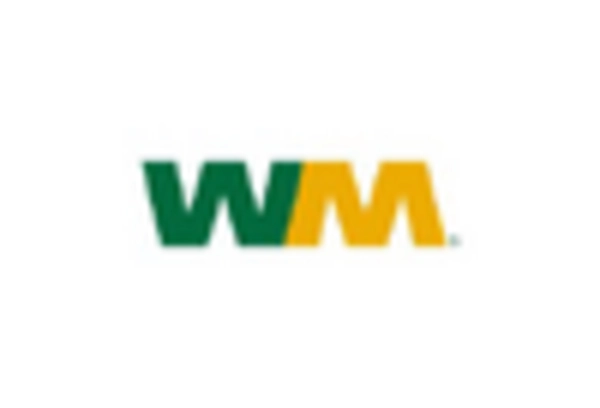Urbanization and Population Growth
The rapid urbanization in China is a crucial driver for the smart waste-management market. As cities expand, the volume of waste generated increases significantly. By 2025, it is estimated that urban areas will house over 60% of the population, leading to a projected waste generation of approximately 500 million tons annually. This surge necessitates advanced waste management solutions to efficiently handle the increasing waste volume. Smart waste-management technologies, such as IoT-enabled bins and automated sorting systems, are becoming essential to streamline operations and reduce costs. The integration of these technologies can enhance collection efficiency and optimize resource allocation, thereby addressing the challenges posed by urbanization. Consequently, the demand for innovative waste management solutions is likely to grow, propelling the smart waste-management market forward.
Regulatory Framework and Compliance
The regulatory landscape in China is evolving, with the government implementing stricter waste management policies. The introduction of the Waste Management Law in 2020 has set the stage for enhanced compliance requirements for waste disposal and recycling. This regulatory framework encourages municipalities to adopt smart waste-management solutions to meet compliance standards. By 2025, local governments are expected to invest heavily in smart technologies to ensure adherence to these regulations. The market for smart waste-management is likely to benefit from this trend, as municipalities seek to leverage technology for efficient waste tracking and reporting. The potential for penalties for non-compliance further incentivizes the adoption of smart solutions, making this a significant driver for the market.
Environmental Sustainability Initiatives
Environmental sustainability is increasingly becoming a priority in China, influencing the smart waste-management market. The government's commitment to reducing carbon emissions and promoting circular economy practices is driving the demand for sustainable waste management solutions. By 2025, initiatives aimed at reducing landfill waste by 30% are expected to be in place, necessitating the adoption of smart waste-management technologies. These solutions facilitate better waste segregation, recycling, and recovery, aligning with national sustainability goals. The emphasis on reducing environmental impact is likely to encourage investments in smart technologies that promote efficient waste processing and resource recovery. As a result, the smart waste-management market is poised for growth, driven by the need for environmentally responsible waste management practices.
Technological Advancements in Waste Processing
Technological advancements play a pivotal role in shaping the smart waste-management market in China. Innovations such as AI-driven sorting systems and real-time waste monitoring are transforming traditional waste management practices. By 2025, it is anticipated that the market for smart waste management technologies will reach approximately $10 billion, driven by the need for efficiency and sustainability. These technologies not only enhance operational efficiency but also contribute to better resource recovery and recycling rates. The integration of advanced analytics allows for predictive maintenance and optimized collection routes, reducing operational costs. As these technologies become more accessible, their adoption is likely to accelerate, further propelling the growth of the smart waste-management market.
Public-Private Partnerships in Waste Management
Public-private partnerships (PPPs) are emerging as a significant driver for the smart waste-management market in China. These collaborations between government entities and private companies facilitate the development and implementation of innovative waste management solutions. By 2025, it is expected that more than 50% of waste management projects will involve PPPs, leveraging private sector expertise and investment. This trend allows for the integration of advanced technologies and efficient operational practices, enhancing the overall effectiveness of waste management systems. The financial backing from private entities can accelerate the deployment of smart waste-management technologies, making them more accessible to municipalities. Consequently, the growth of PPPs is likely to play a crucial role in advancing the smart waste-management market.
















